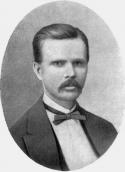Ivan Nechuy-Levitsky
Ivan S. Levitsky (13 (25) November 1838 – 20 March (2 April) 1918) – Ukrainian writer.
Ivan Nechuy – his pen name (he also published his works under pseudonyms I.Bashtovyj, A.Hlahol, O.Krynytskyj; from 1890-s began to use signature I.Nechuy-Levitsky, which came into general distribution to distinguish his from other Levitsky).
Ivan was born in the town Stebliv (today – Korsun-Shevchenko district Cherkassy region) in the family priest. Stebliv is situated on Ros river, and this river, villages and towns near on it became a favorite place of short stories and novels writer.
Education he received in Boguslav school (1845 – 1853), Kyiv Seminary (1853 – 1858), Kiev Theological Academy (1861 – 1865). After graduating from the academy, he abandoned the spiritual life and worked as a teacher of Russian language (1865 – 1885) in various secondary schools.
In 1885 he retired and settled in Kiev, which almost did not leave. There he died and was buried in the Baikove cemetery.
The literary work I.Nechuy-Levitsky began shortly after graduation. His creative growth contributed P. Kulish, who was his adviser and editor, and gave his first pieces for publication to the Lviv, to the magazine "Pravda (The Truth)". Much of works I.Nechuy-Levitsky was first published in Galicia, in Lviv; in Russian Empire his works often spoiled or completely banned by the censors.
The main theme of prose I.Nechuy-Levitsky – contemporary life of Ukrainian peasants and urban intellectuals, the emergence layer laborers. Some of his fiction works devoted the history of Ukraine. He also wrote popular brochures on the history of Ukraine.
Throughout the life I.Nechuy-Levitsky spoke with theoretical and journalistic articles that advocated the unity of the Ukrainian language, discussed the importance of literature for the development of the Ukrainian people. It is significant that in his abundant literary heritage there were no works in Russian, which was at that time not very common.
Creativity I.Nechuy-Levitsky had a very significant impact on his contemporaries and the next generation of Ukrainian. He is rightly considered a classic of Ukrainian literature.
M. Zh., 21 October 2016

